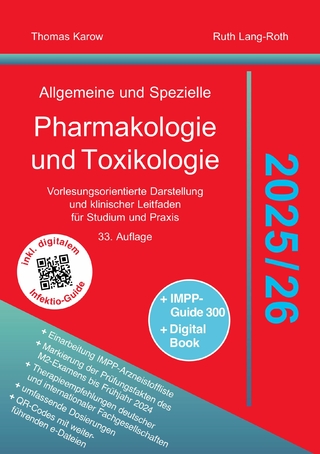
Remedy and Contaminant Components in Complementary Medicines
Elsevier Science Publishing Co Inc (Verlag)
978-0-12-816038-1 (ISBN)
- Noch nicht erschienen (ca. Januar 2025)
- Versandkostenfrei
- Auch auf Rechnung
- Artikel merken
Every chapter incorporates comprehensive reviews covering the above topics with recent references, to introduce researchers to this field of interest and provide them with information that can easily be built upon.
Dr Nanthi Bolan completed his PhD in Soil Science and Plant Nutrition at the University of Western Australia, and is currently working as a Professor of Environmental Science at the University of Newcastle. His teaching and research interests include contaminant assessment and remediation, nutrient and carbon cycling, pollutants interactions in soils, greenhouse gas emission, soil remediation, and waste management. Nanthi is a Fellow of American Soil Science Society, American Society of Agronomy and New Zealand Soil Science Society, and was awarded the Communicator of the Year award by the New Zealand Institute of Agricultural Sciences. He has supervised more than 40 postgraduate students and was awarded the Massey University Research Medal for excellence in postgraduate students’ supervision. He has published more than 300 journal papers, and edited 4 books, and was awarded the M.L. Leamy Award in recognition of the most meritorious contribution to soil science. Dr Chun Guang Li is the Leader of Pre-Clinical Research Program and Head of Herbal Analysis and Pharmacology Laboratory at The National Institute of Complementary Medicine (NICM), University of Western Sydney. He completed his PhD in Pharmacology at the University of Melbourne in 1991 and held positions as Director of the Chinese Medicine Research Group and leader of the Herbal Pharmacology and Toxicology team at School of Health Sciences, RMIT University from 2007-2012. He commenced his current role as Pharmacology leader at NICM in late 2012. Dr Li has been extensively involved in medical research over the past decades. His current research interests are in the areas of traditional and natural medicines with a particular focus on chemistry and the bioactivity of natural products and medicines, including health food supplements and herbal medicines. Dr. Li has directed a number of funded research projects, coordinated three courses, supervised more than 20 PhD students and published over 150 articles in peer reviewed journals with more than 4900 citations and H-index 35. Dr. Ok is a full professor and global research director of Korea University, Seoul, Korea. He has published over 900 research papers and books, 92 of which have been ranked as Web of Science ESI top papers (90 have been selected as “Highly Cited Papers (HCPs), and two as “Hot Papers). He has been a Web of Science Highly Cited Researcher (HCR) since 2018 in Cross Field, Environment and Ecology, and Engineering. In 2019, he became the first Korean to be selected as an HCR in the field of Environment and Ecology. Again in 2021, he became the first Korean HCR in two fields: Environment and Ecology, and Engineering. He is working at the vanguard of global efforts to develop sustainable waste management strategies and technologies to address the rising crisis in electronic and plastic waste, and pollution of soil and air with particulate matter. Dr. Ok has also served in a number of positions worldwide including, as an honorary professor at the University of Queensland (Australia), a visiting professor at Tsinghua University (China), an adjunct professor at the University of Wuppertal (Germany), and a guest professor at Ghent University (Belgium). He maintains a worldwide professional network by serving as a Co-Editor-in-Chief of Critical Reviews in Environmental Science and Technology, an Editor of Environmental Pollution, a member of the editorial advisory board of Environmental Science & Technology, and an editorial board member of Renewable and Sustainable Energy Reviews, Chemical Engineering Journal, and Environmental Science: Water Research & Technology, and several other top journals. He currently serves as the Director of the Sustainable Waste Management Program for the Association of Pacific Rim Universities (APRU) and the Co-President of the International ESG Association. Moreover, he has served on the Scientific Organizing Committee of P4G Nature Forum: Climate Change and Biodiversity, and Nature Forum: Plastics and Sustainability. Dr. Ok has also served as the chairman of numerous major conferences such as Engineering Sustainable Development series (ESD series), organized by the APRU and the American Institute of Chemical Engineers (AIChE). In 2021, Dr. Ok hosted the first Nature conference among South Korean universities in Seoul on waste management and valorization for a sustainable future together with Chief Editors of Nature Sustainability (Dr. Monica Contestabile), Nature Electronics (Dr. Owain Vaughan), and Nature Nanotechnology (Dr. Fabio Pulizzi). Prof. Ok will host the first Nature Forum on Environmental, Social & Governance (ESG) for Global Sustainability: the “E Pillar for Sustainable Business.
1. Complementary medicines: Definition, value and regulations
2. Sources of Heavy Metal(loid)s in Complementary Medicines
3. Sources of organic contaminants in Complementary medicines
4. Sources of microbial contaminants in complementary medicines
5. Distribution of Heavy Metal(loid)s in Complementary Medicines
6. Distribution of organic contaminants in Complementary Medicines
7. Distribution of microbial contaminants in Complementary Medicines
8. Bioavailability of Heavy Metal(loid)s in Complementary Medicines
9. Bioavailability of organic contaminants in Complementary Medicines
10. Bioavailability of microbial contaminants in Complementary Medicines
11. Toxicity of Heavy Metal(loid) in Complementary Medicines
12. Toxicity of organic contaminants in Complementary Medicines
13. Toxicity of Microbial contaminants in Complementary Medicines
14. Other contaminants in Complementary medicines
15. Cass studies of toxicity of contaminants in Complementary medicines
16. Management guidelines for the safe and beneficial use of Complementary medicines
| Erscheinungsdatum | 02.03.2020 |
|---|---|
| Sprache | englisch |
| Maße | 152 x 229 mm |
| Themenwelt | Studium ► 2. Studienabschnitt (Klinik) ► Pharmakologie / Toxikologie |
| Naturwissenschaften ► Biologie ► Ökologie / Naturschutz | |
| Naturwissenschaften ► Chemie ► Organische Chemie | |
| ISBN-10 | 0-12-816038-1 / 0128160381 |
| ISBN-13 | 978-0-12-816038-1 / 9780128160381 |
| Zustand | Neuware |
| Haben Sie eine Frage zum Produkt? |
aus dem Bereich


